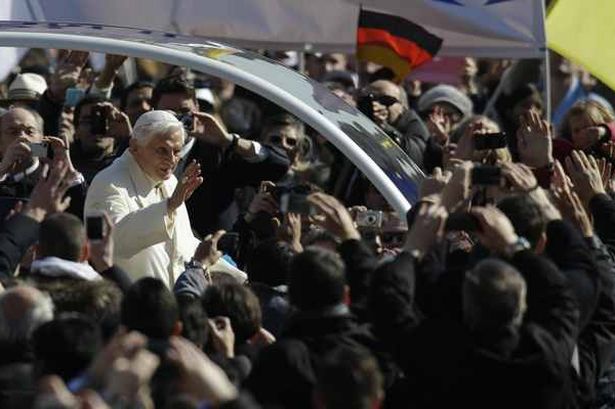
Thousands of pilgrims gathered in St Peter’s Square in the Vatican for Pope Benedict XVI’s final general audience.
The Pope has admitted he faced “choppy waters” during his eight years at the helm of the Roman Catholic Church, but says he was guided by God and felt his presence every day.
Pope Benedict XVI, 85, will retire on Thursday – the first pope to abdicate since Gregory XII in 1415.
His successor will be chosen in a conclave to take place in March.
Pope Benedict told the crowd his papacy had been “a heavy burden” but he accepted it because he was sure that God would guide him.
At times he “felt like St Peter with his apostles on the Lake of Galilee”, he said, making reference to the Biblical story when the disciples were battling against heavy waves and Jesus Christ appeared to them.
The Church has been beset by scandals over sexual abuse by priests and leaked confidential documents revealing corruption and infighting in the Vatican.
Pope Benedict thanked his flock for respecting his decision to retire and said he was standing down for the good of the Church.
“I took this step [resignation] in full awareness of its gravity and novelty but with profound serenity of spirit,” he said in his address.
As a result of his surprise announcement, the Church has now amended its laws to bring forward the election of a successor.
A conclave beginning in mid-March would have left little time to have a new pope installed for one of the most important periods in the Catholic calendar, Holy Week, leading up to Easter, which begins on March 24.

On Thursday the Pope will travel by helicopter to his summer residence at Castel Gandolfo, about 15 miles south-east of Rome. He will cease to be Pope at 20:00 local time.
After Benedict XVI steps down, he will become known as “pope emeritus”.
He will retain the honorific “His Holiness” after his abdication and will continue to be known by his papal title of Benedict XVI, rather than reverting to Joseph Ratzinger.
He will wear his distinctive white cassock without any cape or trimmings, but will surrender his gold ring of office and his personal seal will be destroyed.
He will also give up wearing his red shoes.
“On the one hand I felt that since the decision that he would leave office and resign became public, Pope Benedict is relieved,” said the head of the German bishops’ conference, Archbishop Robert Zollitsch.
“But he also now feels the sympathy of the people for him, and therefore he will have a sense of melancholy and nostalgia, a bit of sadness.”
The title “emeritus” is used when a person of status, such as a professor or bishop, hands over their position, so their former rank can be retained in their title.
The Pope is to spend his final hours at his Vatican residence saying farewell to the cardinals who have been his closest aides during his eight-year pontificate.
His personal archive of documents will be packed up and, at 20:00 on Thursday, the Swiss Guard on duty at his Castel Gandolfo residence will be dismissed, to be replaced by Vatican police.
This will mark the formal end of his papacy and the beginning of the period of transition to his successor, due to be chosen next month.
From March 4, the College of Cardinals will meet in general congregations to discuss the problems facing the Church and set a date for the start of the secret election, or conclave, to elect Pope Benedict’s successor.
That successor will be chosen by 115 cardinal-electors (those younger than 80 years old) through ballots held in the Vatican’s Sistine Chapel.
A two-thirds-plus-one vote majority is required. Sixty-seven of the electors were appointed by Benedict XVI, and the remainder by his predecessor John Paul II.
About half the cardinal-electors (60) are European – 21 of them Italian – and many have worked for the administrative body of the Church, the Curia, in Rome.
[youtube gbV6FHAyckA]